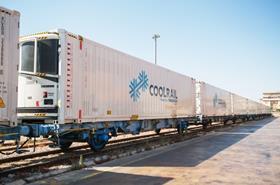
Fresh produce rail route CoolRail has revealed that it has sent its first container full of fresh fruit and vegetables to Denmark. The fresh produce was delivered by train from Almussafes, Valencia.
CoolRail said that it marked another step towards consolidating rail transport as the key to sustainable logistics.
After this first successful test run, the goal for the short and medium term is to make this a regular route. That was according to Transfesa Logistics, which is collaborating with Euro Pool System to extend the service across Europe.
Increasing demand
The initiative of using rail as the exclusive mode of transport in the supply chain aims to meet increasing demand from customers such as Coop Trading.
The company supplies the main retail cooperatives in Denmark, Finland, Norway and Sweden, all of which are involved in the CoolRail project.
The cooperative that received this first consignment to be sent 100 per cent by rail was Coop Denmark. According to Transfesa Logistics Coop Denmark is committed to environmental concerns and seeks to supply products competitively but without polluting.
Competitive, environment-friendly delivery
The consignment started at Almussafes (Valencia) and reached its final destination in Denmark after a single stop in Cologne to change trains.
The main benefits of this new route are the transit time of five days, which is very competitive, and savings of more than 70 per cent in CO2 emissions compared to road transport.
Moreover, the return trip is also economically feasible because the returning train carries empty pallets belonging to Euro Pool System.
“We have made great progress by consolidating CoolRail as the most sustainable and efficient distribution network for sending fresh products to the whole of Europe. Customers in Nordic countries are pleased to see rail transport at the heart of the supply chain,' said Transfesa Logistics’ key account manager, Pedro Ramos. 'They are very concerned about protecting the environment and the world in which they operate and keen to find emission-free logistics solutions to contribute to the reduction of CO2.”
Ramos added that the initiative was an opportunity to promote the use of rail for goods transport throughout the European continent.



